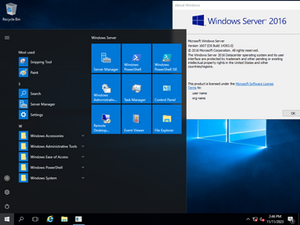Nano Server
| A version of the Windows NT operating system | |

Screenshot of Windows Server 2016 with Desktop Experience
|
|
| Developer | Microsoft |
|---|---|
| OS family | Microsoft Windows |
| Source model | Closed source and shared source |
| Released to manufacturing |
September 26, 2016 |
| General availability |
October 12, 2016 |
| Latest release | 1607 (10.0.14393.1532) / July 18, 2017 |
| Latest preview | RS3 (10.0.16278.0) / September 5, 2017 |
| Update method | Windows Update, Windows Server Update Services, SCCM |
| Platforms | x86-64 |
| Kernel type | Hybrid (Windows NT kernel) |
| Default user interface |
Windows shell (Graphical) Microsoft PowerShell (Command line) |
| License | Trialware, Volume licensing, Microsoft Software Assurance, MSDN subscription, Microsoft Imagine |
| Preceded by | Windows Server 2012 R2 (2013) |
| Official website | microsoft |
| Support status | |
|
|
Windows Server 2016 is a server operating system developed by Microsoft as part of the Windows NT family of operating systems, developed concurrently with Windows 10. The first early preview version (Technical Preview) became available on October 1, 2014 together with the first technical preview of System Center. Windows Server 2016 was released on September 26, 2016 at Microsoft's Ignite conference and became generally available on October 12, 2016.
Windows Server 2016 has a variety of new features, including
Microsoft announced a new installation option, Nano Server, which offers a minimal-footprint headless version of Windows Server. It excludes the graphical user interface, WoW64 (support for 32-bit software) and Windows Installer. It does not support console login, either locally or via Remote Desktop Connection. All management is performed remotely via Windows Management Instrumentation (WMI), Windows PowerShell and Remote Server Management Tools (a collection of web-based GUI and command line tools). However, in Technical Preview 5, Microsoft has re-added the ability to administer Nano Server locally through PowerShell. According to Microsoft engineer Jeffrey Snover, Nano Server has 93% lower VHD size, 92% fewer critical security advisories, and 80% fewer reboots than Windows Server.
Nano Server is only available to Microsoft Software Assurance customers and on cloud computing platforms such as Microsoft Azure and Amazon Web Services.
Starting with the new feature release of Windows Server, version 1709, Nano Server can only be installed inside a container host.
...
Wikipedia
